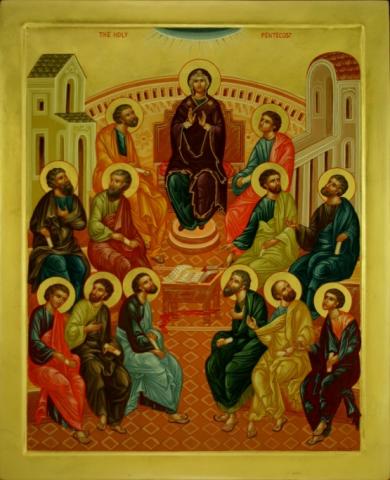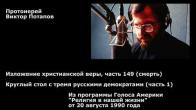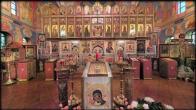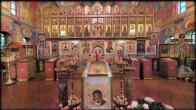You are here
THE IMPORTANCE OF GOD’S GRACE IN CHRISTIAN LIFE (On the Feast of Holy Pentecost)

+Bishop Alexander (Mileant)
Every person carries seeds of goodness. But no seed can germinate and ripen without moisture and light. For this reason everyone who truly craves righteousness has to recognize that without God’s help, without His support and guidance, any progress in spiritual life is impossible. Being aware of the lack of godly feelings within himself, a pious man of Old Testament times appealed to God: “My soul yearns for Thee, as the barren soil” (Ps. 142/KJV Ps. 143).
God’s grace renews our soul, purifies our conscience, enlightens our mind, strengthens in us the faith, directs our will to goodness, warms our heart with genuine love, elevates our thoughts, and revives our whole nature. As witnessed by many holy men and women, God’s grace brings so much peace and joy into the human soul that earthly advantages and pleasures seem to be neglibible in comparision with it.
Since the day of the descent of the Holy Spirit upon the Apostles, everyone newly baptized is linked to the miracle of Pentecost through the sacrament of Chrismation. In the Sacrament, usually performed right after Baptism, the newly baptized is favored with the same gifts of the Holy Spirit which the Apostles received 2000 years ago. The power of this sacrament is so great and everlasting that it, like Baptism, is never repeated. Subsequent sacraments such as Confession and Eucharist, church services, private prayers, fasting, acts of mercy and a virtuous life are aimed at strengthening in the Christian the divine gift he has already received in Chrismation.
God’s grace possesses the extraordinary power of renewal. This becomes apparent in the profound inner and outward changes that take place in the person who has opened his heart to God. As a most vivid example we may refer to the Apostles, who were known first as simple, uneducated fishermen possessing no obvious talents. Yet, once the Holy Spirit descended upon them, they became so enriched spiritually, and gained such wisdom and strength, that they brought to faith not only simple peasants, but philosophers and noblemen as well. Their words, inspired by God’s grace, penetrated into the most hardened hearts: they disposed sinners to repentance and the selfish to righteousness, and pointed the one who had lost heart to diligence.
Doubtful and timid as they were during the Savior’s life, the Apostles after the descent of the Holy Spirit were transformed into bold preachers of the Kingdom of Heaven. It was as a result of the holy gifts they were given that so many Christian communities appeared already during the 1st Century – from Scythia to North Africa, and from Spain to Persia and India. Thus, owing to their enthusiasm, Chritisianity began spreading all over the world, bringing with it the renewal of society.
It is instructive to read the book “Acts of the Holy Apostles,” which illustrates the profound changes that were happening to society as it became renewed by the grace of God. Indeed, we see how former unbelievers, who had been driven by selfish desires and had no higher aspirations, after turning to Christ and receiving the Holy Spirit, became deeply believing, pious men filled with diligence and ardent love for God and people.
“They (the newly baptized),” we read in the book of Acts, “devoted themselves to the Apostles’ teachings and fellowship, to the breaking of bread (Communion) and prayers ... And all who believed were together and had all things in common: and they sold their possessions and goods and distributed them to all, as need directed. And day by day, attending the temple together and breaking bread in their homes, they partook of food with glad and generous hearts, praising God and finding favor with all the people. And the Lord added to their number day by day those who were of one heart and soul, and no one said that any of the things which he possessed was his own, but they had everything in common ... There was not a needy person among them” (Acts 2:42-47; 4:32-35).
In short, meekness, love and aspiration for the divine replaced all sinfulness and brutality within them.
As our Savior teaches, the desire for spiritual life comes to a person only from the Holy Spirit. It is not a naturally occurring disposition. “Unless one is born of water and the Spirit, he cannot enter the Kingdom of God ... That which is born of flesh is flesh, and that which is born of the Spirit is spirit” (John 3:5-6). The Savior taught that the Holy Spirit guides a person in the truth, comforts him in sorrow and satisfies his spiritual thirst. (See: John 16:13-17; 4:13-14). The Apostle Paul calls all Christian virtues gifts of the Holy Spirit. He says: “The fruit of the Spirit is love, joy, peace, patience, kindness, goodness, faithfulness, gentleness and self-control” (Gal. 5:22-23 It often occurs that the inner spiritual growth and activity of a Christian is developed unbeknownst to him, as the Lord explained in the parable of a scattered seed. (Mark 4:26-29). The Savior told about the miraculous effect of the Holy Spirit on the human soul: “The wind blows where it wishes, and you hear the sound of it, but cannot tell where it comes from and where it goes. So is everyone who is born of the Spirit” (John 3:8).
Besides general spiritual gifts necessary for the inner growth of every Christian, the Holy Spirit grants to certain persons special gifts needed for them to be ministers of the Church and Christian society. About these gifts the Apostle Paul writes: “To each is given the manifestation of the Spirit for the common good. To one is given through the Spirit the utterance of wisdom, and to another the utterance of knowledge according to the same Spirit, to another faith by the same Spirit, to another gifts of healing by the same Spirit, to another the working of miracles, to another prophecy, to another the ability to distinguish between spirits, to another various kinds of tongues, to another the interpretation of tongues. All these are inspired by one and the same Spirit, who apportions to each individually as He wills” (1 Cor. 12:7-11). [Further, the Apostle compares the Church to the body, each part of which has its individual function. “And He gave some apostles, and some prophets; and some evangelists; and some pastors and teachers; for the perfection of the saints, for the work of the ministry, for the edifying of the Body of Christ” (Еphesians 4:11-12).]
Every Christian, being a living temple of the grace of the Holy Spirit, must preserve himself from any foulness and sin. Saint Paul admonished some Corinthian Christians who forgot about this: “Do you know that you are God’s temple and that God’s Spirit dwells in you? ... If anyone destroys God’s temple (by his immoderation) then God shall destroy him. For God’s temple is holy, and that temple is you” (I Corinthians 3:16-17).
In His parable about the ten maidens the Lord spoke of the necessity of preserving and increasing spiritual gifts. Without them a Christian becomes like a lamp without oil (Matthew 25:1-13). When explaining this parable, Saint Seraphim of Sarov said that the main purpose of our life is the “acquisition” of the grace of the Holy Spirit. (See his conversation with Motovilov).
Although the beneficial power of the Holy Spirit is given to a believer not according to his merits but by God’s mercy, it increases in him in proportion to his diligence in the Christian life. Saint Isaac the Syrian writes: “To what degree a man advances towards his God intentionally, in like manner God advances towards him with His Grace.” Thus Saint Peter directs Christians: “His Divine power has granted to us all things that pertain to life and godliness…. For this very reason make every effort to supplement your faith with virtue, and virtue with knowledge, and knowledge with self-control, and self-control with steadfastness, and steadfastness with godliness, and godliness with brotherly affection, and brotherly affection with love” (II Peter 1:3-7). The Apostle Paul urges Christians to invite God’s grace by righteous living and prayers, saying: “Walk as children of light, for the fruit of light is found in all that is good and right and true ... be filled with the Spirit, addressing yourselves with psalms and words of glory, singing praises to the Lord with all your hearts.” (Ephesians 5:8-9, 18).
In the Orthodox Church it is customary to begin all private prayers as well as church services by first addressing the Holy Spirit in a special prayer and asking Him to renew His grace within us. This prayer, which starts with the words “O Heavenly King,” is remarkable in that it consists of the words said by our Lord Jesus Christ and it guides a Christian toward what is important to ask from God.
Prayer to the Holy Spirit:
O Heavenly King, Comforter, Spirit of Truth, Who art everywhere present and fillest all things, Treasury of Good things and Giver of Life, come and dwell in us, and cleanse us of all impurity, and save our souls, O Good One.
Here the Holy Spirit is called “Heavenly King,” because He is the third Person of the Holy Trinity, equal to the Father and His Son. He is called the Comforter because He consoles the believers and gives them joy in time of grief. He is called the Spirit of Truth as He reveals to the faithful the realities of spiritual life and helps them to love the truth. He is omnipresent because the divine nature has no bounds or obstacles. He is called the treasury of blessings and the giver of Life as He is the ultimate source of everything that is of value. He gave life to all of nature and, in particular, higher spiritual life to human beings and angels.
Addressing the Holy Spirit in this way, we ask Him, the Almighty, to cleanse us from every passion which originates within us or attaches to us in dealing with sinful people. We ask Him to stay within us and guide us to eternal salvation. When praying to the Holy Spirit, one should preserve a humble attitude and recognize his unworthiness, because “God resisteth the proud but giveth grace unto the humble.” (James 4:6).
PARISH LIFE
Address of our Cathedral
Subscribe to our mailing list
While all the materials on this site are copyrighted, you may use them freely as long as you treat them
with respect and provide attribution on the Russian Orthodox Cathedral of St.John the Baptist of Washington DC.









